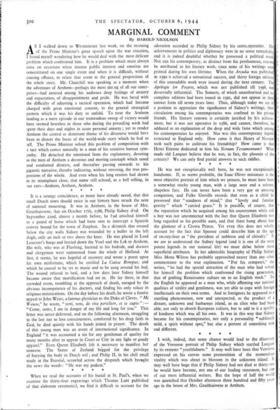It is a strange coincidence, as many have already noted,
that this small Dutch town should twice in our history have struck the note of national mourning. It was in Arnhem, in the house of Mrs. Gruithuissens, :hat on October 17th, 1586, Philip Sidney d'ed. On September 22nd, almost a month before, he 1-ad attached himself to a patrol of horse which had been sent to intercept a Spanish convoy bound for the town of Zutphen. In a skirmish that ensued below the city walls Sidney was wounded by a bullet in the left thigh, only an inch or two above the knee. He was placed in Lord Leicester's barge and ferried down the Yssel and the Lek to Arnhem. His wife, who was at Flushing, hurried to his bedside, and doctors and clergymen were summoned from the whole of Holland. At first, it seems, he was hopeful of recovery and wrote a poem upon his own misfortune, which he entitled La Cuisse Rompue, and which he caused to be set to music and to be sung around his bed. The wound refused to heal, and a few days later Sidney himself became aware that mortification had set in. He lay there, in that crowded room, trembling at the approach of death, enraged by the obvious incompetence of his doctors, and finding his only solace in religious ministrations. On the day before his death, he wrote a frantic appeal to John Weier, a famous physician to the Duke of Cleves. " Mi Weiere," he wrote, " veni, veni, de vita periclitor, et te cupio":— "Come, come, I am in danger of my life and long for you." This letter was never delivered, and on the following afternoon, struggling to the last not to lose consciousness, comforted by his deep faith in God, he died quietly with his hands joined in prayer. The death of this young man was an event of international significance. In England "it was accounted a sin for any gentleman of quality for many months after to appear in Court or City in any light or gaudy apparel." Even Queen Elizabeth felt it necessary to manifest her remorse. The States of Zeeland begged for the privilege of burying the body in Dutch soil ; and Philip II, in his chill small study at the Escorial, scrawled across the despatch which brought the news the words : "He was my godson."


























 Previous page
Previous page